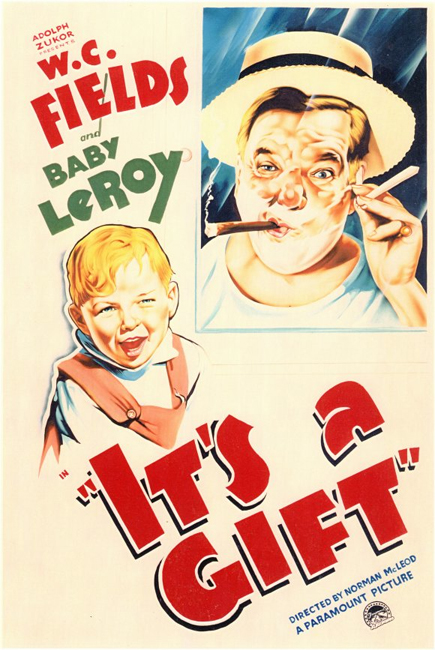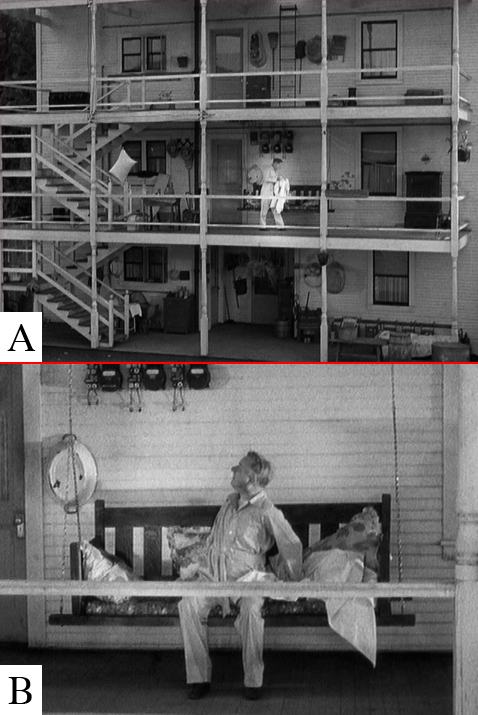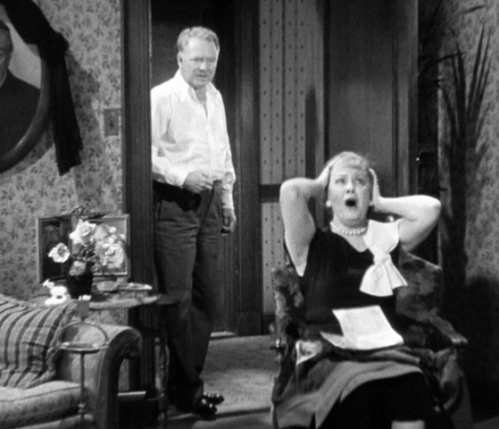 Beginning tomorrow, Friday, April 22nd, New York City’s Film Forum, will have a 12-day W.C. Fields film festival, showing most of his films (all 35mm prints!). So it’s a perfect time to share some of my observations on Mr. Fields. I think most people nowadays—those unfamiliar with his films—would characterize his iconic persona as ‘a drunk who doesn’t like children.’ There’s a lot of truth to that interpretation, but there was much more, something that I became more attune to as I got older. The characters in his domestic comedies (i.e. The Man on a Flying Trapeze or The Bank Dick) endured a very deep suffering. The struggle of being a husband, a father, a provider is a theme I began to appreciate as I’ve moved on in years. Subsequently, my aching laughter when watching his films has evolved into empathy.
Beginning tomorrow, Friday, April 22nd, New York City’s Film Forum, will have a 12-day W.C. Fields film festival, showing most of his films (all 35mm prints!). So it’s a perfect time to share some of my observations on Mr. Fields. I think most people nowadays—those unfamiliar with his films—would characterize his iconic persona as ‘a drunk who doesn’t like children.’ There’s a lot of truth to that interpretation, but there was much more, something that I became more attune to as I got older. The characters in his domestic comedies (i.e. The Man on a Flying Trapeze or The Bank Dick) endured a very deep suffering. The struggle of being a husband, a father, a provider is a theme I began to appreciate as I’ve moved on in years. Subsequently, my aching laughter when watching his films has evolved into empathy.
A case in point is It’s a Gift (1934), generally regarded as Fields’s masterpiece and the film that kicks off the Film Forum Festival this weekend. Fields plays Harold Bissonette, a family man and owner of a grocery store, who suffers endlessly at the hands of his wife, children, customers—even his neighbor’s children–all the while dreaming of buying an orange grove in California. Most scenes are set-pieces, isolated sketches, typical of comedies of the early 30s; for example, early on, in his store he concurrently battles an enraged customer demanding kumquats, an inept employee, and the blind, near-deaf, cane-swinging Mr. Muckle. It’s sisyphean comedy at its best. It’s not unlike scenes from his earlier shorts, i.e. “The Dentist,” but thanks to the context—a middle-aged man pursuing his dreams against tremendous odds—the pain in these scenes is all the more painful.
I think my point is shown best midway through the film. It’s nighttime and having already endured endless hen-pecking from his wife, Harold takes his pillow and blanket outside (A). Thus begins an 11-minute sequence, where he tries in vain to sleep on their apartment balcony (B). Although the clock says it’s 4:30am—when all the world should be asleep–he’s unknowingly moved into the eye of the storm.
In short order, he’s tormented by a falling cocoanut (1), a bottle-clanking milkman (2), an ice-pick-wielding toddler (3), and a continuation of his wife’s needling (4).

He’s even harassed by an insurance salesman…
In my teens, the funniest part of this scene was the prolonged spelling of the ridiculous name “LaFong,” however, as an adult/husband/father/freelancer trying to eke out a living, I’m struck by the sad, sad irony of trying to sleep while a man cheerfully tells you you’ll have to work every day until you’re 90. That’s when my laughter turns to fatigue. And fear. And bonding. If you listen closely, at the end of the clip, he emotes under his breath, “If I could only retire now.” No wonder at one point later in the scene, he looks at the camera—at us—as if to say, “See what I have to deal with?”…
The film is such an endless gagfest, it’s easy to miss its most subdued moment, its most poignant. Harold’s just used a recent inheritance to purchase an orange grove, much to his wife’s dismay. She badgers and bemoans, all of which he takes without rebuttal, like any beaten man would. However, at the end of the scene, he quietly tells her, as he’s leaving the room, that he’s sold their grocery store, a selfish act that will uproot his family. Her shock and outrage tells us he’s never done anything like this before.
But it’s Fields’s delivery that is so effective. There’s no fanfare, no argument, no “I’m putting my foot down!” outburst. He just says it. Because if Harold didn’t seize control, didn’t act impetuously, didn’t instigate change with his own hand, then all the other suffering would truly be unbearable. And so when he tells his wife that he’s irrevocably changed their lives, it’s the film’s Moment of Clarity, Harold’s quiet assertion of controlling his own destiny.
__________________________________________________
For further reading I steer you to “Godfrey Daniel!”, an excellent piece by Ivan G. Shreve, Jr., on the blog Edward Copeland on Film. Shreve and I share a similar take on Fields’s film persona, and he astutely observes that his characters “suffer the slings and arrows…with a Zen-like stoicism that instantly puts the viewer in his corner.”
I also heartily recommend going to Film Forum and seeing any of Fields’s films with a packed house, which is how his films were meant to be seen. You shouldn’t take anything I’ve written here as an indication to look for something deeper, certainly not at the sake of laughing your pants off. But it’s there. It doesn’t make the films funnier; it just makes them more than funny.
__________________________________________________
(By the way, I may not make it to Film Forum this weekend, where It’s a Gift is sharing a bill with “The Dentist.” If anyone does, please tell me which print of the latter they use. For further explanation of the various prints of the film that exist, check out my post W.C. Fields and the Musical Laughtrack.)






Completely on the mark in every way, and yet still my favorite part of the post is your with-an-A spelling of “cocoanut” — rarely used, greatly missed.
I’m flattered you noticed, Elizabeth–but it’s all connected: That’s the spelling of the title of the first Marx Bros. feature, which is, of course, of the same era as W.C.’s films. When you put it in those terms, well, Hell, how else would I spell it?
One of my favorite films and the first Fields film I owned on VHS back in the day (bought from the Film Classics rack at Waldenbooks which also supplied me with Buster Keaton’s The General).
When I ran the film series at SUNY Purchase I showed almost all the Fields shorts as well as The Man On The Flying Trapeze.
There’s a tendency I’ve noticed for film restorers to rely on the best 35mm material even in the face of more complete or more faithful 16mm materials. It’s only a guess but I’d think that it’s most likely that the original release version of The Dentist is probably only available in 16mm and all existing 35mm material was altered for re-release.